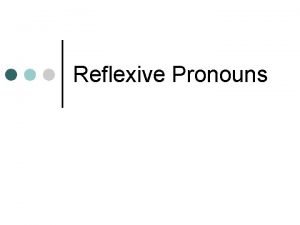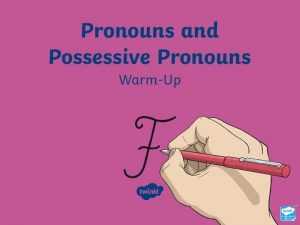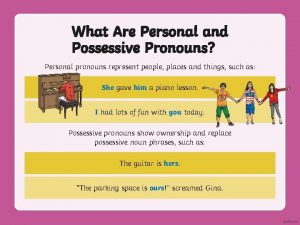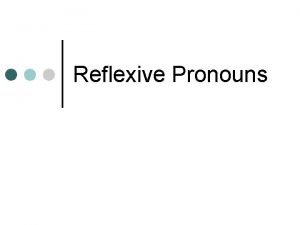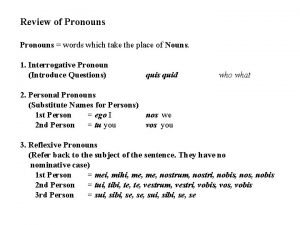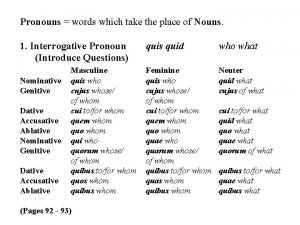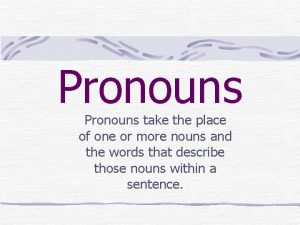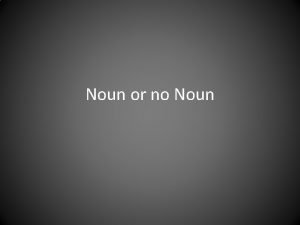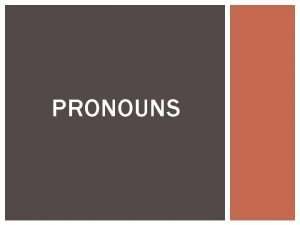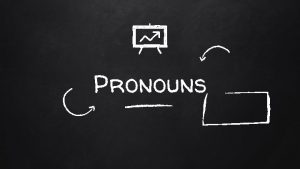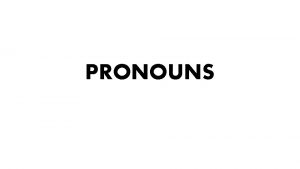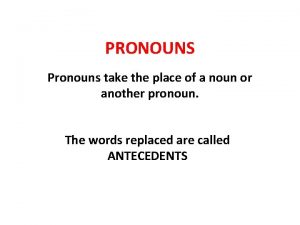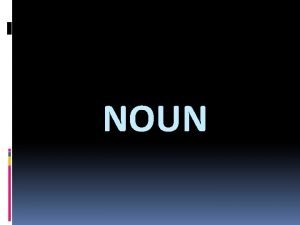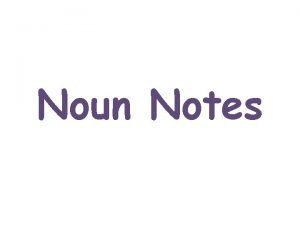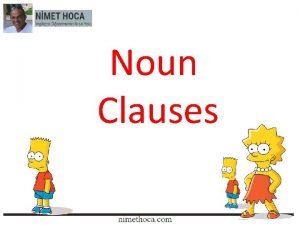PRONOUNS Pronounstakes the place of a noun or













- Slides: 13

PRONOUNS

Pronouns-takes the place of a noun or noun phrase. Examples: he, it, them Without pronouns: Frederick spilled a cup of milk on my mother and father. With pronouns: He spilled it on them.

Pronoun Antecedents – the noun or nouns the pronoun refers to or replaces.

Rules of Antecedents: 1. ) The antecedent can be in the same sentence. Antecedent Example: Mackenzie has a speech to give, and she would like to practice.

Rules of Antecedents: 2. ) The antecedent can be in a different sentence. Antecedent Example: Jason wants to make a video. He is looking for good scenes to include in it.

Rules of Antecedents: 3. ) Be sure the pronoun agrees with the antecedent in gender (male or female) and number (singular or plural). Example: Mrs. Taylor wants to see original presentations. They need to be creative.

Singular pronouns – take the place of one person, place, thing or idea. Examples: I, you, he, she, it, me, him, her

Plural pronouns – takes the place of more than one person, thing or idea. Examples: they, we, them, us, you

Practice: Identify the pronoun and the antecedent. Follow the example below when writing your answers: 1. ) Rachel is tired, even though she slept for ten hours last night. 1. ) Pronoun – she Antecedent – Rachel

1. ) Apparently Tom and Sarah just landed. Who is picking them up? 2. ) Tomorrow the detective and I will turn over all of our evidence to the authorities. 3. ) Taking care of pets can be difficult, but it is quite worthwhile. 4. ) A flea can consume fifteen times its body weight in blood each day. 5. ) The musicians in that band are highly talented, but talent alone won’t be enough to succeed in the music business; they will need plenty of luck, too.

Subjective Personal Pronouns – acts as the subject of the sentence Example Subject Pronouns: I, you, he, she, it, we, they Example Sentence: You bought all the applesauce in the whole store.

Objective Personal Pronouns – follows an action verb or a preposition. Example Object Pronouns: me, you, her, him, it, us, them Example Sentences: 1. ) Vinny and Lucy invited us to the play! 2. ) Izzy did their homework for them.

Possessive Pronouns – shows ownership or possession. Example Possession Pronouns: mine, yours, his, hers, ours, theirs Example Sentences: 1. ) The computer is ours. 2. ) Sometimes Patricia likes to take things that are mine not hers.
 Takes the place of a noun or noun phrase
Takes the place of a noun or noun phrase Common proper and collective nouns worksheet
Common proper and collective nouns worksheet Demonstrative and relative adjectives
Demonstrative and relative adjectives Reflexive pronouns function
Reflexive pronouns function Possessive and personal pronouns
Possessive and personal pronouns Interrogative demonstrative pronouns
Interrogative demonstrative pronouns Subject pronouns and object pronouns exercises
Subject pronouns and object pronouns exercises Possessive pronouns and relative pronouns
Possessive pronouns and relative pronouns Match the possessive below
Match the possessive below Reflexive pronouns we
Reflexive pronouns we Reflexive and reciprocal pronouns exercises
Reflexive and reciprocal pronouns exercises Sui sibi se se
Sui sibi se se Words that take the place of nouns
Words that take the place of nouns Pronouns take the place of
Pronouns take the place of



